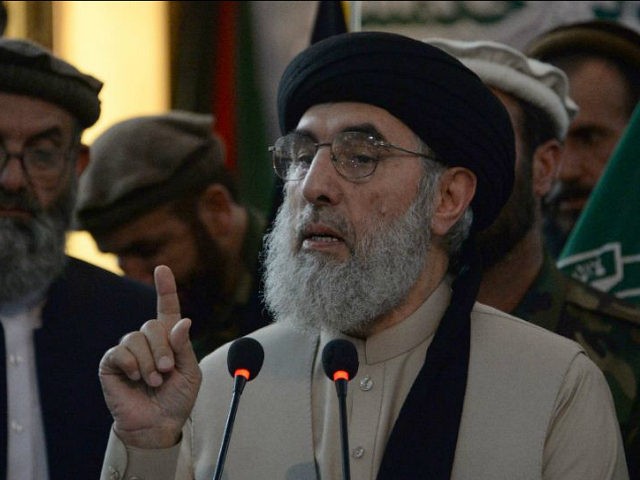United States-backed Afghan President Ashraf Ghani welcomed the return to the country’s capital of a notorious U.S.-designated global terrorist known as the “Butcher of Kabul” who has urged his alleged Taliban “brothers” to “stop this pointless holy war” in Afghanistan, therefore ending “all reasons for the presence of foreign troops.”
The Taliban has long maintained that U.S.-led foreign troops must withdraw from Afghanistan before it engages in peace negotiations with the war-ravaged country’s government.
Notorious Afghan warlord and global terrorist Gulbuddin Hekmatyar offered to mediate peace talks between the Taliban and the Afghan government.
He declared that the U.S.-brokered national unity government led by Ghani and Chief Executive Abdullah Abdullah was “not working,” adding that either Ghani or Abdullah should resign.
“Let’s end the war, live together as brothers and then ask foreigners to leave our country,” declared the notorious Afghan warlord Hekmatyar, 69, during a ceremony that Ghani held in his honor at the Afghan presidential palace.
The warlord urged the Taliban to “join the peace caravan and stop this pointless holy war.”
“I call upon the Taliban to choose me as their brother. I will fight for all your legitimate demands,” he also said, suggesting that, through peace negotiations, the Taliban could “end all reasons for the presence of foreign troops” in Afghanistan.
Under President Ghani in September 2016, Hekmatyar reached a peace agreement with the U.S.-backed Afghan government despite his history of war crimes.
The warlord is the leader of the Hezb-e-Islami Gulbuddin (HIG) group, also known as Hezb-i-Islami.
U.S. officials have affiliated HIG with the Taliban and their allies al-Qaeda.
Although the U.S. Department has not deemed HIG a foreign terrorist organization, it has designated its leader Hekmatyar a global terrorist.
In addition to attacks against the Afghan government, particularly in Kabul, HIG has been linked to the death of American civilians and military personnel.
HIG is “a virulently anti-Western insurgent group whose goal is to replace the Western-backed Afghan Government with an Islamic state rooted in sharia in line with Hekmatyar’s vision of a Pashtun-dominated Afghanistan,” reported the U.S. National Counterterrorism Center (NCTC).
“Hekmatyar fought against the U.S.-backed government in Kabul, and called for the Americans — his supporters in the 1980s — to leave Afghanistan,” points out National Public Radio (NPR).
Nevertheless, President Ghani welcomed Hekmatyar to the Presidential Palace in Kabul and thanked him for “heeding the peace call.”
In 2012, the U.S. State Department welcomed the peace agreement between Hekmatyar and the Afghan government but added that the warlord remained a designated terrorist.
NPR reports:
Hekmatyar, 69, is among the most prominent surviving figures from the early days of war that began with the Soviet invasion of Afghanistan in 1979 and grinds on to this day.
…
On the one hand, Hekmatyar’s peaceful return to the Afghan capital — made possible by his agreeing to abide by the country’s constitution and renounce violence — cautiously raises hopes that Ghani’s government can persuade rivals and enemies to stop fighting and bring an end to nearly four decades of conflict.
Many Afghans despise the warlord.
During the Afghan civil war in the 1990s, Hekmatyar’s HIG “controlled the hills on the edge of the capital and fired rockets indiscriminately on the city, destroying entire neighborhoods that dated back centuries,” notes NPR. “An estimated 50,000 were killed and many more injured, almost all civilians, from 1992 to 1996.”
As part of the peace deal he reached with the U.S.-backed Afghan government, the United Nations removed Hekmatyar from its list of global terrorists in February.

COMMENTS
Please let us know if you're having issues with commenting.